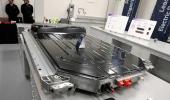The Centre will invest around Rs 200 crore over five years for the exploration and development of these mines.

An employee works at the Tolillar salt flat in Salta, Argentina. Photograph: Agustin Marcarian/Reuters
India is close to striking a deal to acquire five lithium blocks for exploration and development in Argentina with the negotiations entering "final stages", a senior official said, even as the country is engaged in talks with other nations rich in critical minerals.
The agreement will be signed between the Khanij Bidesh India Ltd (KABIL) -- a joint venture company focused on identifying, acquiring, developing, processing and making commercial use of strategic minerals in overseas locations for supply in India -- and Catamarca Minera Y Energética Sociedad Del Estado (CAMYEN), a State-owned mining and energy company in the Argentine province of Catamarca.
The Centre will also invest around Rs 200 crore (Rs 2 billion) over five years for the exploration and development of these mines, Business Standard has learnt.
"The talks are in the final stages, and a proposal has already been submitted to the Cabinet Committee on Economic Affairs for approval," said the government official aware of the development.
After Australia, this is India's second attempt to sign a foreign partnership for sourcing critical minerals.
In 2022, India signed a memorandum of understanding with Australia's Critical Minerals Facilitation Office to explore five blocks -- two dedicated to lithium and three to cobalt.
India is also strategising to set up KABIL's offshore office in Catamarca to streamline coordination with provincial regulatory authorities.
"Engaging in the exploration and extraction of critical minerals in Argentina will require considerable time and ongoing oversight," another senior official said.
"Establishing the offshore office of KABIL is a strategic measure to protect and uphold our interests in this endeavour," the official added.
Argentina holds 20 per cent of the world's 98 million tonnes of lithium resources, second only to Bolivia, according to the United States Geological Survey's Lithium Statistics and Information 2023 report.
These resources are primarily concentrated in salt flats within the provinces of Catamarca, Salta and Jujuy, forming part of the Lithium Triangle.
India is also engaged in talks with Argentina because its salt-lake lithium provides a cost-effective extraction method compared to hard-rock mining. This makes it commercially appealing and contributes significantly to production.
India's efforts in Argentina to secure lithium blocks will propel its quest for self-reliance in meeting clean energy demands.
In a move toward securing the supply chain, India also initiated its inaugural critical minerals auction drive on November 29.
Two lithium blocks in Jammu and Kashmir and Chhattisgarh were made available for bidding.
As per government estimates, the Reasi district block holds approximately 5.9 million tonnes of lithium resources. The auction documents do not specify the mineral quantity for the Chhattisgarh blocks.
Currently, the country meets the lithium demand through 100 per cent import.
India's lithium imports in FY23 amounted to roughly $3 billion (approximately Rs 24,900 crore/Rs 249 billion), marking a 58 per cent increase from FY22, according to ministry of commerce and industry data.
The data also reveals that over 95 per cent of India's lithium imports originate from China and Hong Kong.
In addition to Argentina and Australia, KABIL is actively engaged in discussions with numerous countries rich in critical minerals, including Bolivia and Chile.
The exploration and development agreement for five lithium blocks will aid India's objective to attain net-zero emissions by 2070 and establish itself as a manufacturing hub for electric vehicles.
Lithium finds extensive use in various applications, particularly in the manufacturing of lithium-ion batteries.
These batteries power a wide array of devices such as smartphones, laptops, electric vehicles and energy storage systems for renewable energy sources like solar and wind power.
Also, lithium is employed in certain medical treatments, ceramics, and as a component in aerospace technology.

Feature Presentation: Ashish Narsale/Rediff.com











